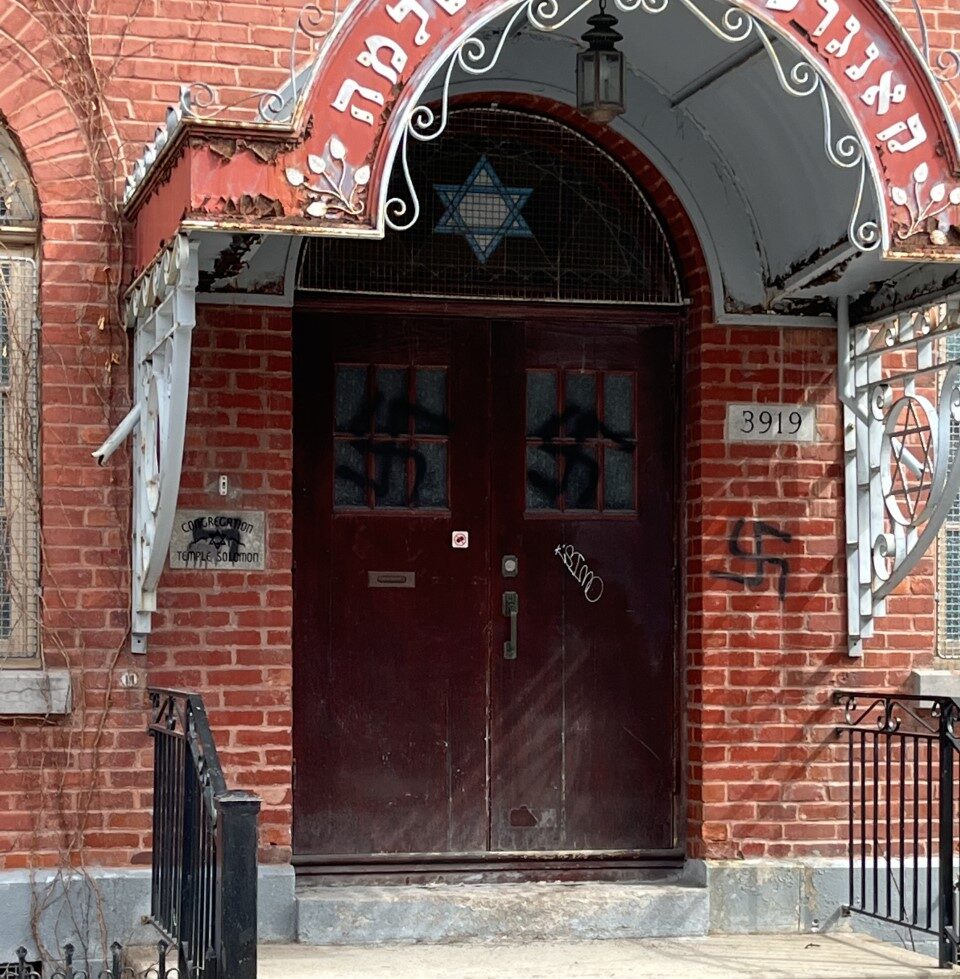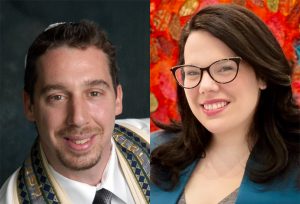Members of the Montreal police hate crimes unit were expected to meet today (March 29) with officials of the historic Bagg Street Shul after it was defaced with Nazi symbols.
Michael Kaplan, the century-old synagogue’s president, said the vandalism occurred sometime over the weekend. He described it as the first such incident of its kind in his 15-year association with the shul, which is located in the Plateau Mont Royal district at 3919 Clark St., corner of Bagg Street, once the heart of the Jewish community.
Police said they would have no further comment at this time.
Photos released by B’nai Brith Canada show swastikas spray-painted in black on the two windows of the front door, another on the brick wall to the right, and an X over a plaque with Hebrew writing.
Congregation Temple Solomon, as the small Orthodox shul is officially known, is described as the oldest continuously used synagogue building in Quebec. The congregation moved into the edifice, which dates back to the turn of the century, in 1921.
Today the shul has no formal membership, but holds Shabbat and holiday services – at no cost – and welcomes hundreds of visitors a year who are awed by its brightly painted sanctuary which has been faithfully maintained to the original design.
The shul is recognized as a heritage site by both the Quebec government and the City of Montreal.
The vandalism was condemned by Jewish organizations with B’nai Brith calling it “a clear act of antisemitism” and the Centre for Israel and Jewish Affairs saying it was “horrified.” Both groups said they are working with police to ensure the security of the community and that the perpetrators are prosecuted.
Foreign Affairs Minister Mélanie Joly, a Montreal MP, tweeted, “The antisemitic attack on this historic synagogue is shocking and deeply troubling. We will not tolerate antisemitism here or anywhere. It is imperative that communities feel safe to practice their faith. To Montreal’s Jewish community, we stand with you.”
Montreal Mayor Valérie Plante also communicated her dismay and solidarity with the Jewish community on Twitter. “I am fully with the Jewish community and firmly condemn these antisemitic acts that have no place in our society.”
On March 29, Marvin Rotrand, national director of B’nai Brith’s League for Human Rights, sent a letter to Plante and the city council urging that, in the wake of the shul’s desecration, the administration be “more proactive in combating antisemitism.”
Specifically, he asks that the council recognize Yom ha-Shoah at its April 18 meeting and that the city observe Jewish Heritage Month in a meaningful way this May, which the council unanimously recognized in a motion last year.
Rotrand, a former longtime city councillor, also suggests the Plante administration bring back a gesture started by former mayor Gérald Tremblay of inviting the Jewish community on Yom ha-Shoah to city hall, where the names of Holocaust victims were read aloud.
Rotrand notes that the number of antisemitic incidents recorded in Quebec in 2021 increased by 20 percent over the previous year, with the majority occurring in Montreal, according to a B’nai Brith audit.
In later comments, Plante reiterated her consternation at the incident, stressing “our message is loud and clear: there is no place for any type of discrimination or racism” and that she understands the “shock” the Jewish community feels.
Opposition leader Aref Salem stated that it was an “odious act” that is especially troubling because of the shul’s historic and symbolic significance.
Toronto-based Friends of Simon Wiesenthal Centre also issued a condemnation, saying, “this vile act shows us that Jew-hatred is alive and well in Canada and it is time for allies to join the Jewish community in containing it.”
The Bagg Street shul is the last of a couple of dozen synagogues that once dotted the Plateau, when it was home to waves of Jewish immigrants.
Despite the loss of members, the shul continued to keep its doors open largely through the dedication over four decades of its custodian Joe Brick, until his death in 2009.
At that point, the descendants of founder Baris Kaplan, who are in the construction business, stepped in to fully renovate the badly deteriorated building. The shul continues to be maintained by private support.







